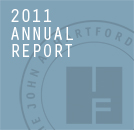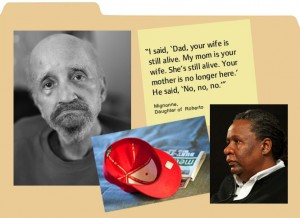 It happens all too often: an older adult goes into the hospital and starts behaving strangely—hallucinating, rambling, showing signs of agitation, or becoming disoriented. He or she may not even recognize loved ones. What’s the diagnosis according to far too many health care providers? Dementia. And this despite the fact that dementia always has a gradual, not sudden, onset.
It happens all too often: an older adult goes into the hospital and starts behaving strangely—hallucinating, rambling, showing signs of agitation, or becoming disoriented. He or she may not even recognize loved ones. What’s the diagnosis according to far too many health care providers? Dementia. And this despite the fact that dementia always has a gradual, not sudden, onset.
It happened to Nora OBrien-Suric’s father and Chris Langston’s uncle. It also happened to Roberto, whom we feature in our 2011 Hartford Foundation Annual Report. All of them had delirium, a reversible condition that can affect older adults after surgery or an illness.
 What’s the solution? We need to educate health care providers as well as older adults and their loved ones about delirium and other mental health issues. The solution lies in astute practitioners like Pamela Cacchione, PhD, RN, BC, and her nursing student, Ashley King, MSN, RN, who had the skills and clinical training to assess and address Roberto’s delirium in order to restore his quality of life.
What’s the solution? We need to educate health care providers as well as older adults and their loved ones about delirium and other mental health issues. The solution lies in astute practitioners like Pamela Cacchione, PhD, RN, BC, and her nursing student, Ashley King, MSN, RN, who had the skills and clinical training to assess and address Roberto’s delirium in order to restore his quality of life.
Roberto’s story is part of the 2011 Hartford Annual Report’s look at the Geropsychiatric Nursing Collaborative (GPNC), which we founded with the American Academy of Nursing in 2008. The nurse leaders of the Collaborative—Drs. Cornelia Beck, Kitty Buckwalter, and Lois Evans, hailing from three Hartford Centers of Geriatric Nursing Excellence--recognized the need to improve nursing students’ knowledge of mental health and older adults. Therefore, the GPNC both established a set of geropsych nursing competencies for all levels of nursing education as well as developed and disseminated geropsych nursing curricular materials. These helpful geropsych-focused teaching resources are housed on the Portal of Geriatric Online Education (POGOe). You can find a video tutorial to help you access these free resources here.
In addition to reading about the GPNC and Roberto’s story, you can also watch a video featuring Dr. Melissa Aselage, a Building Academic Geriatric Nursing Capacity Scholar and Claire M. Fagin Fellow and Assistant Professor at the Duke University School of Nursing and hear the stories of three Duke University nursing students who found training in mental health and aging to be invaluable to their careers.
Susannah, William, and Sam—the nurses featured in the video--will all go on to provide thoughtful, quality care for older adults due to their geropsychiatric nursing education. This should be the goal for all nursing students. Please use the materials created by the Geropsychiatric Nursing Collaborative. Share this post and the video with your nursing colleagues. Encourage nursing professors to use the POGOe materials. Let’s make training in geropsychiatric nursing the norm rather than the exception.
Other blogs in the 2011 Annual Report series:
2011 Hartford Foundation Annual Report: Mental Health and the Older Adult
